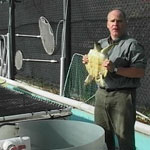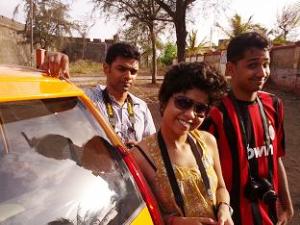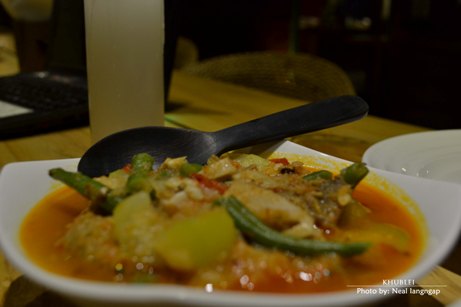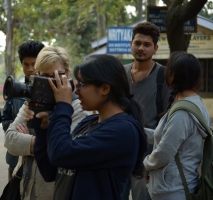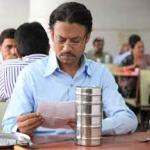It was the early 1980s. My uncle took me to watch this new English film that had just reached Guwahati and making waves already. Urvashi Cinema Hall at Fancy Bazar back then, was nothing less than a multiplex by today's standards. Fulmama (umm, affectionate term for maternal uncle) and his friends were pretty excited to watch this 'action' film.
Initially, I was underwhelmed. The movie starred this lanky, Chinese fellow who mumbled his dialogues and looked too decent to, you know, fight. A few more minutes, and my jaw dropped - this guy didn't seem to have any bones in his body, and he made whupping bad guys look like Sanjeev Kapoor making Maggie 2-minutenoodles (bad example, I know, but you get the drift). Was I hooked! The movie was 'Enter The Dragon', and the guy was named Bruce Lee.
I wasn't the only one fascinated by martial arts films, or as they were called then - 'Karate' films. Bollywood, being a fast learner as always, quickly threw up film after film, in the 70s-80s with heroes doing 'Karate' - which basically constituted our protagonist bending forward his torso about 45 degrees, spreading his hands like wings and making 'poses', accompanied by some appropriate 'hoo-ha!' noises. Over the years, some did it better than others. Our dear Akki did a very good job of this 'posing' - to his credit, he was trained in Taekwondo and Muay Thai - but we could catch precious little of that on screen.
And so, when I heard a few months back that a young first-time filmmaker had made India's first true-blue Martial Arts-based action film, my first reaction was to smirk and quickly forget all about it. Some days later, Kenny Basumatary posted the trailer of his new film "Local Kung Fu" on Facebook. I had to check it out, since I knew Kenny as a discerning film-buff who wrote for PassionForCinema.com, a now-defunct hangout of film lovers and aspiring film makers, and also the fact that he hailed from Guwahati, my home-town.
I saw the trailer. Getting hit with a brick on the face would have caused a lesser shock. It had some kick-ass action sequences, all of them as true to technique and style as the Bruce Lee and Jackie Chan films of yore. And what's more, it managed to be funny, with some hilarious moments. I saw the trailer again. And again. I hated that I couldn't get to see the film right away.
As fate would have it (love that line!), in a few weeks, I was sitting in a suburban studio, watching the film. I couldn't remember the last time I was this engrossed and 'involved' with a movie - biting my proverbial nails at some scenes, laughing my heart out at others. The story was rather simple. Charlie is a simple guy who's trying his best to woo his lady-love's parents and sister ("Ah, that takes rolling quite a few papads", you must be thinking). But his luck and his tummy keep letting him down.
Charlie's passion is learning Martial Arts, and he seems quite adept. His would-be father-in-law gets in trouble with some shady characters - they rough him up. When they threaten his girl, Charlie must intervene. But there's a problem - you see the ring-leader, Dulu, is a crack at Martial Arts, probably a notch better than Charlie! This is where the adventure begins - Charlie must fight to protect his honor, his girlfriend, and his bad tummy. Yes, it's as crazy as it sounds.
Throughout this film you'll meet a host of colorful characters, especially the most vibrant, somewhat cute and motley crew of bad guys you'll ever see in today's cinema. Watch out for 'Bonzo', the "no. 1 under-18 Don", you won't forget that one in a while. Dulu, the baddie, is as rotten as they come, but a man of honor nevertheless. He'd rough up innocent people for money, but also disciplines his brothers with a cane when they go astray. Tansen, his aptly-named side-kick, beside practicing kicks and punches, also keeps up his riyaaz of Hindustani Classical, much to dulu's chagrin. Kenny does a commendable job as the equally unsure-of-himself but at-times-cocky Charlie.
But soul of the film is the Martial Arts. One gets to see some dizzying action sequences - at times it totally seems like people are kicking each other for real. Kenny tells me the style employed in the film is close to Wing Chun, an ancient form of Martial Arts depicted in the 2008 film Ip Man and it's sequel, Ip Man 2 (2010). The action is fast-paced, pulsating and real. The Great American Rope Trick, which is behind many a Hollywood 'flying kick', thankfully hasn't been used here - more by choice than by compulsion. Kenny is a big time Martial Arts enthusiast, his passion for it almost equaling his love for cinema, as is evident from the scores of practice and combat videos that he's uploaded on his YouTube Channel.
One might think all this action makes the mood a bit sombre. No sir. Local Kung Fu is full of the kind of scenes which you remember much later, when you're back home doing something else, and laugh like crazy! There's one chase sequence during the climax that is unique in the history of cinema - no shit.
After seeing the film, one finds it quite unbelievable that this quaint, delightful film was made with all of Rs. 95,000. That's interesting, considering most of the scenes were of sterling production quality, with some decent performances and breath-taking action. More power to Kenny Basumatary and those like him.
An International Film on Local Budget
Amborish Roychoudhury catches up with filmmaker Kenny Basumatary on his fascinating new film Local Kung-Fu made on an ultra-thin budget. Inspired by Jackie Chan and Stephen Chow, minus their huge budgets and stunts, Kenny's budget included about 200 plates of momos, noodles, fried rice, 150 tekeli pithas (traditional Assamese sweetmeat, coffee
Q: What made you think of creating LKF? What's the genesis?
I've wanted to work in films since around class VI. After about two-three years of acting and writing in Mumbai, I realized that no one was going to just give me a bunch of money to go and make a film - not that I went around asking - and my dad didn't have crores of rupees stashed away in a secret chamber in his house. Around this time, I also saw quite a few ultra low-budget films that went on to win a lot of acclaim - films like Once, In Search of a Midnight Kiss, Mirageman, Clerks, El Mariachi etc. These films led me to believe that making a feature of my own, on a next-to-zero budget, wasn't really that much of an impossibility. Hence I started looking out for ways to make it happen.
Q: But why Kung Fu?
We all love good action films, don't we? The funny thing is we have so many talented martial artists, especially in the Northeast India, but we don't have a single proper martial arts film. I also had an extra advantage here, in that my uncle had been a martial arts instructor for two decades, and there was a huge pool of current and former students we could choose from to make our film. A couple of them are among my best friends, and we'd made a few short fighting videos together, a couple of which have done quite well on Youtube, so we decided that we were ready to take the plunge and make a full-length martial arts comedy.
Q: We hear you made this entire movie with all of 95000 bucks. Surely you are joking?
I'll break it down for you:
44,000 - Canon 550D
11,000 - 55-250mm lens
5,000 - Rode VideoMic
7,000 - Memory card, battery, filters etc
2,000 - Fighting equipment
13,000 - Embarassingly small token payments for the actors
The rest - About 200 plates of momos, noodles, fried rice, 150 tekeli pithas (traditional Assamese sweet), coffee etc.
Q: The Actors have done a good job...
Yes, I'm really lucky to be born into a talented circle of friends and family. Apart from the people I'd already worked with, I auditioned everybody - didn't want amateurish acting to bring the level of the film down.
Q: The film was shot in a DSLR Camera? Any particular reason for the choice?
I did a lot of research on which camera would suit our purposes best. Then a couple of friends advised me to buy the Canon 550D, and one of them went on to buy it himself. I tried it out and obviously loved it, so I got one for myself. Only later did I come to know of the advantages of a DSLR. I didn't know, then, that HD footage could be blown up for the big screen.
Q: In spite of the violence, there was never the slightest hint of gore or bloodshed - was that a conscious choice?
Yes, for two reasons. One, I didn't want our fights to be the scary, bloody, violent kind, because I wanted it to be a family friendly-film, Jackie Chan / Stephen Chow style. I wanted the fights to be entertaining and fun. And secondly, taking care of the continuity of the blood and black eyes would have been a big headache.
Q: What were the challenges during making the film?
In the initial stages, the challenges were mostly technical, cinematography related. There were some things I didn't know how to deal with, like highlights burnout on sunny days. I asked the DoP of JayHind.tv, on which I act, and also did a lot of reading on the net. So we solved the issue by using an ND filter for normal scenes and high shutter speeds for action scenes. I really don't remember any major challenges we had. Everyone was nice and co-operative; all I had to do was be patient. The only tricky thing was scheduling - my cousins had school and college and tuition, friends and uncles had jobs and families to take care of - so we had to work within all of this and get people together whenever they were free.
Q: How was the experience of Directing - any surprises, any learnings?
Surprises...probably not too many, since I already knew most of the people I worked with - their temperaments, their endurance. But I did get to learn quite a lot. The importance of storyboarding to get work done efficiently, learning that most non-professional actors can only go a certain number of takes before starting to fade, which lens to use when, the need to keep your script short and tight, the importance of pace and energy in the individual moments of a scene as it's being shot - I could go on and on.
Q: How was it directing this motley crowd of youngsters? And how was it shooting in Guwahati?
It was fun. Half of them were my cousins and the other half my friends or theirs, so we had quite a blast. If any of them goofed up, we could easily laugh about it, relax and carry on - no worries of wasting film or holding up a 40-man crew. We always rehearsed thoroughly, until I got exactly the performance I wanted, or as close to it as possible. And the fights we really, really practiced a lot. Even one accidental blow can lead to serious injury, so we were very careful about not hurting each other. I'm proud of the fact that apart from two non-serious kicks that connected with my neck and thigh, no one got injured during the fights.
Shooting in Guwahati was fun. The DSLR was a huge advantage in that nobody in the general public would think that something serious was going on with such a small camera. We could unobtrusively shoot scenes in public places, most of which we were already regular visitors to. For the fights, we chose secluded locations - a couple of hilltops, a school ground, a quiet lane - so that we would not have too many people standing around. After pretty much every shooting day, we'd go and have momos near Guwahati Commerce College.
Q: Who (or what) have been your influences in film making?
That's a really long list. But for Local Kung Fu, the prime influences have obviously been Jackie Chan and Stephen Chow, minus their huge budgets and stunts, as well as Isaac Florentine - whom very few people have heard about but is a much better action director than many Hollywood A-listers. Watch his Undisputed III and II, starring Scott Adkins, the best martial arts star in the world currently. And also Mirageman, starring Marko Zaror, the Latin Dragon.
Q: After Cinefan, what are your further plans about LKF?
Let's hope we get into a few more festivals, then release it in theatres.
Q: What next - what's your next project?
I have 3-4 options. One is to make the film of my novel Chocolate_Guitar_Momos. Two, a Spinal Tap kind of rock comedy. Three, a semi-biopic of four tribal sisters in rural Assam. Four, a couple of martial arts scripts, including Ek Plate Kung Fu, which came in the top 6 at the Sankalan script lab, and another one which I need to finish first.
Q: What would you say to all the aspiring film makers out there?
Soch lo, beta.
On a serious note, I don't really know if I'm qualified to dispense words of wisdom. There's no set path to becoming a filmmaker. Everyone needs to make their own road.
Find us on facebook: facebook.com/TheThumbPrintMag









